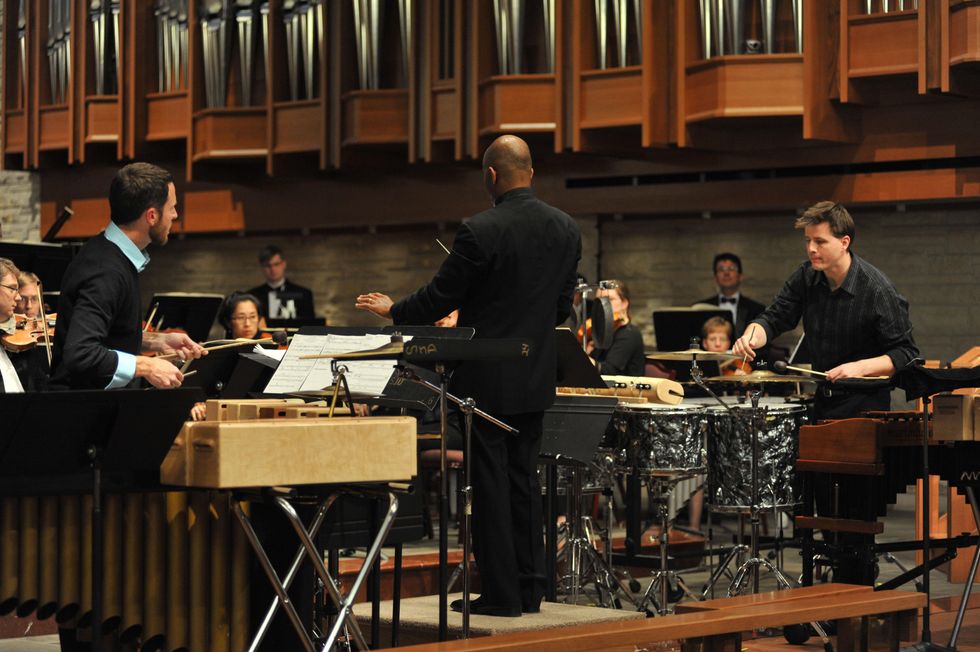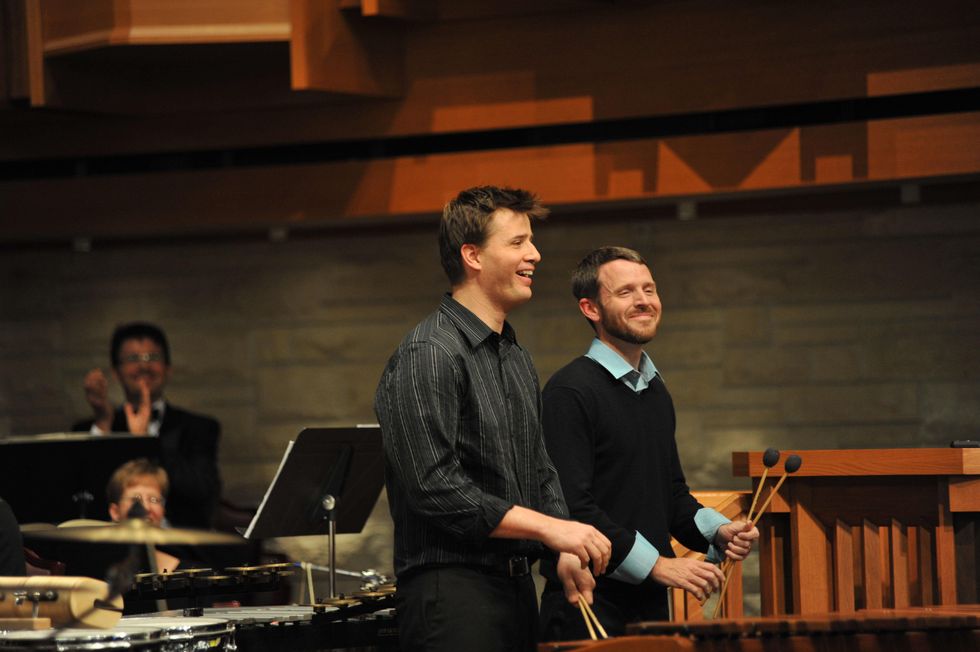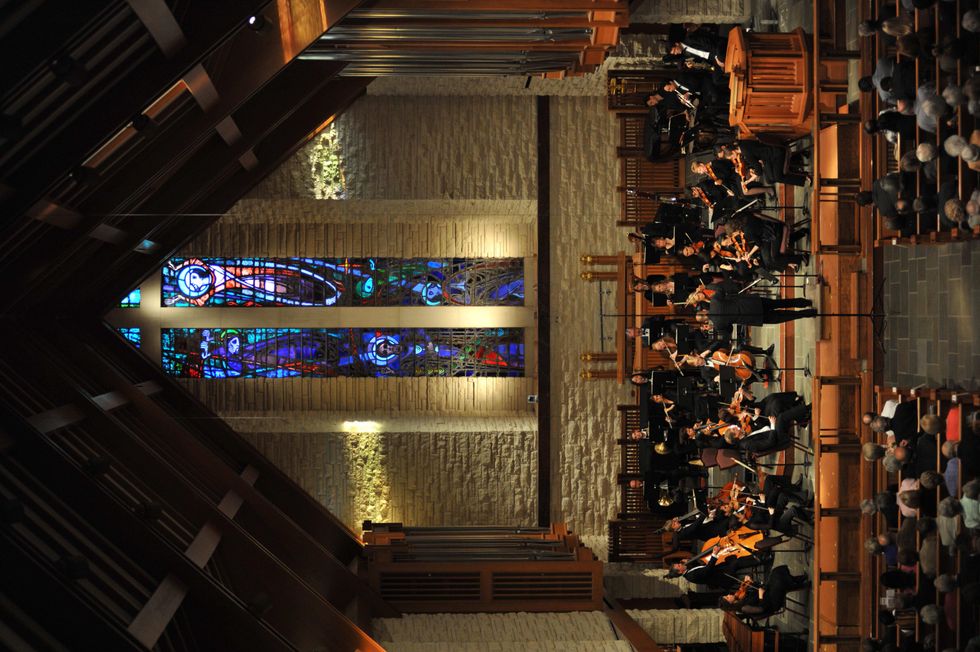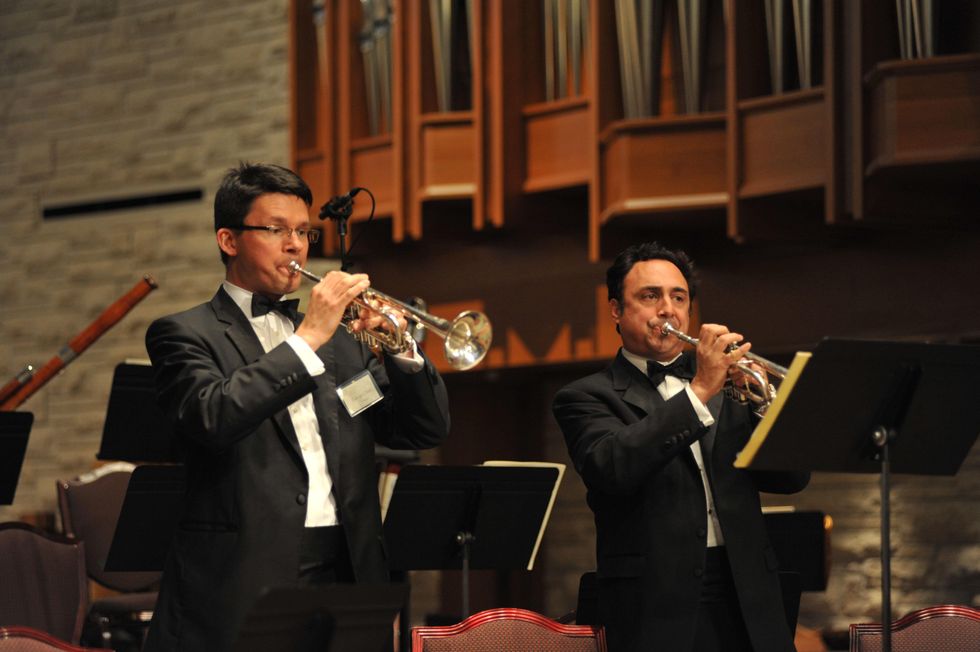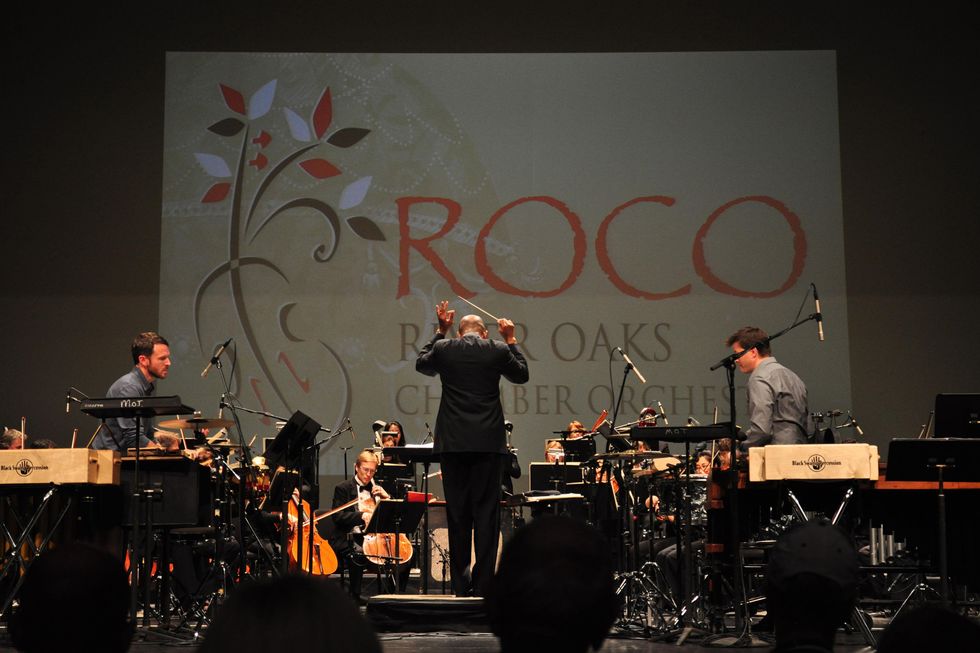Wham, bam — thank you ma'am
A big bang season finale: River Oaks Chamber Orchestra delivers a concert with plenty of 'tude
Clunk! Bonk! Kapow! Thwach! Vronk! Zap! Wham, bam — thank you ma'am.
With the exception of the "thank you" part, one would think that these onomatopoeic words come straight out of a vintage Batman episode — the kind of exclamations that would appear inside spiked callouts accompanied by a wacky chordal blast courtesy of a combination of brass instruments. Oh, the good ol' days when television shows and cartoons were enlivened by real musicians.
But no.
When the River Oaks Chamber Orchestra curated their season finale concert, fittingly nicknamed "Big Bang," it was an allusion to percussion soloists Todd Mehan and Matt McClung as featured in the Houston premiere of Jonathan Leshnoff's Concerto for Two Percussionists, a performance that marked the ensemble's 35th commission.
Beyond ROCO's remarkable commitment to underwrite and advocate for the creation of new music, that the virtuoso showcase was Saturday evening's pièce de résistance at the Church of St. John the Divine — followed by an encore performance at Miller Outdoor Theatre — says something about how founder and principal oboist Alecia Lawyer has conditioned her audience to attend concerts not because of familiar repertoire heard again and again, but because of the ROCO concert experience.
Show up with an open mind and open ears.
You don't need to become a walking encyclopedia of the history of western music or have a doctorate degree to immediately catch on to Leshnoff's compositional strategy. His vocabulary is presented clearly — not on an expensive silver platter, but more humbly on the back of a cocktail napkin — as if listeners are given a comprehensive key to decipher what sometimes can feel like cryptogram. It's all there, emended in the colorful score at the onset of the first movement, Con forza.
No one can be a percussionist without supremacy over rhythmical matters. As such, it was expected that Mehan and McClung deliver acute accuracy. What were electrifying were the sensitive musical shapes that built an organic rise and fall during pitched and unpitched riffs, particularly in swift lines that were passed back and forth between these two friends, each of whom was surrounded by a complex web of instruments de baterie on opposites side of the stage.
Lawyer's oboe airs in The Dove crooned a nostalgic lament suffused with unexpected imagistic effects. In The Nightingale, Jennings flutings glistened with golden pixie dust.
Bowed vibraphones and crotales, tuned gongs, tribal bongos, toms and many mallet changes . . . call it a graceful, tuneful choreography of athletic proportions that dished a feast for the ears as much as for the eyes. More of that song and dance was tapped for the encore on marimba, Bach's Prelude and Fugue No. 2 in C minor, BWV 847, in which gorgeous dynamic swells, harmonic lyricism and light-hearted twirls earned yet another standing ovation for the players.
Another first for ROCO was guest maestro André Raphel, who has been described as a "demonstrative conductor who is physically drawn into the music" (New York Times). It could be that Raphel is accustomed to moving mountains — aka large ensembles like the New York Philharmonic, where he served as assistant conductor to Kurt Masur, and the Philadelphia Orchestra, where we worked alongside Wolfgang Sawallisch. ROCO, in contrast, doesn't need much in terms of demonstrative gestures to get going.
Whereas it may have been appropriate for Beethoven's Coriolan Overture, the surprise opener not listed on the playbill, to lag slightly behind the ictus (it is after all German music after a Roman tragic leader written the grave key of C minor), Mendelssohn's sprightly Symphony No. 4 in A major "Italian" beseeched to bulliently frolic forward in the Allegro vivace. It just didn't.
Though elegant, poised and precise, this chamber orchestra's silky strings are much more limber than what was offered in this nearly pedantic interpretation. Less is more: There's no need to beat four to a bar — and I believe Benjamin Zander would agree.
To a lesser extent, the middle movements suffered from a similar malaise. Yet once the tempo of the fourth movement Saltarello and Tarantella settled, the zippy peasant dance was everything this wicked triple-meter finale should be: Head banging, hopping fun with coquettish flutes — kudos to Christina Jennings and Jennifer Keeney — and flirtatious winds.
Respighi's Gli uccelli (The Birds), a piece mused by 17th century European music traditions, was surely the tiramisu (plus espresso and almond biscotti) of this Italian-themed musicale. Lawyer's oboe airs in The Dove crooned a nostalgic lament suffused with unexpected imagistic effects. In The Nightingale, Jennings flutings glistened with golden pixie dust. Reminiscent of a subdued I pini di Villa Borghese from Pines of Rome, The Cuckoo charmed with fluttering textures, adorable wind fragments and cute celeste chirps.
The Hen on the other hand, as pugnacious as she is, well, I hope she finds herself in a chicken parmigiana. At least then she will be enjoyable. Albeit brilliantly executed, this feathered high and might diva, as depicted in the score, isn't meant to be liked.
Too much 'tude here. Then again, the concert had plenty of that as well. But that's a good thing.
The River Oaks Chamber Orchestra (ROCO) performing "Big Bang" at the Church of St. John the Divine. Percussion soloists Todd Mehan and Matt McClung were showcased in the Houston premiere of Jonathan Leshnoff's Concerto for Two Percussionists.
